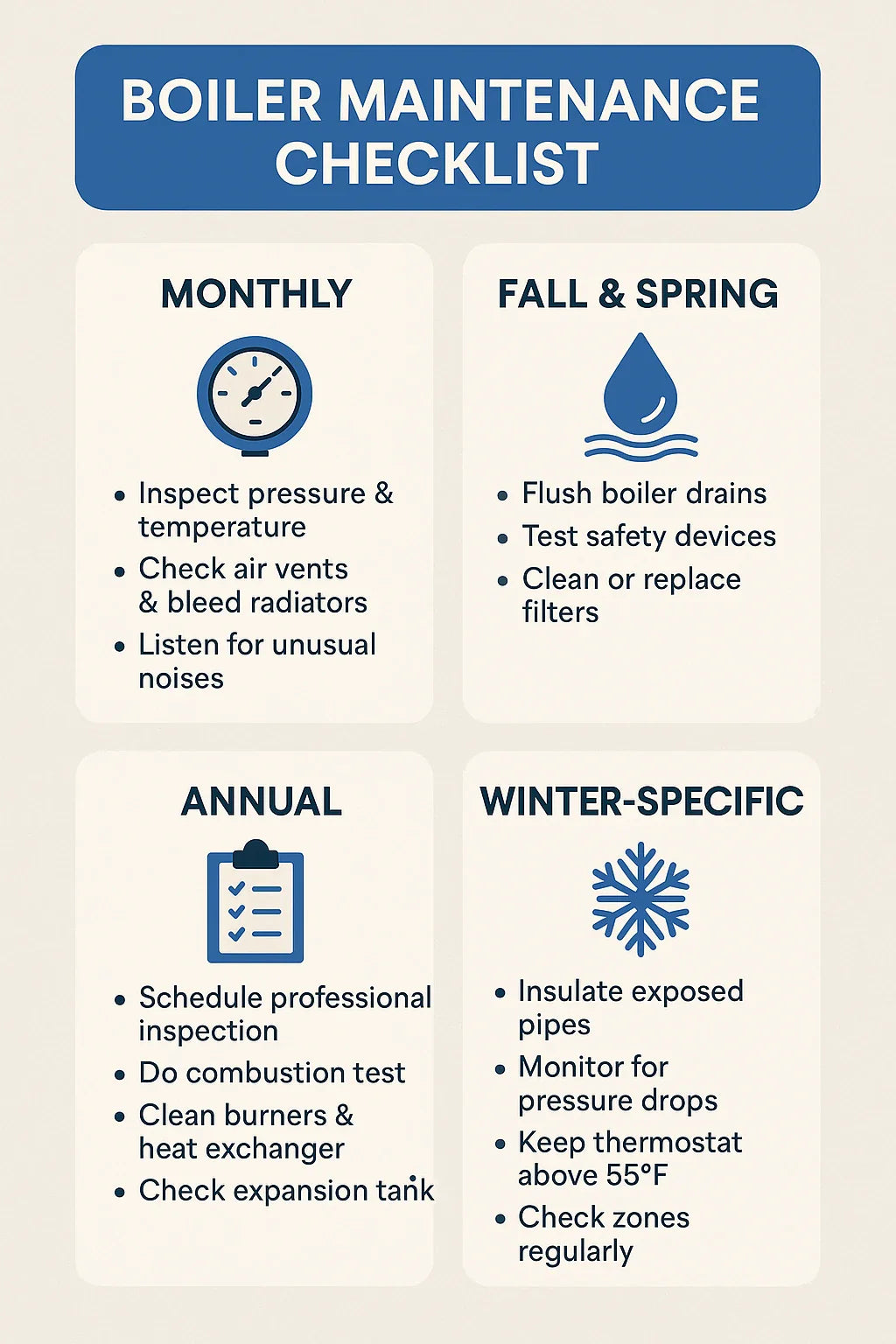When I installed my Weil-McLain CGA-6 Series 3 166,000 BTU Cast Iron Natural Gas Boiler, I assumed it would just run quietly in the basement for decades. After all, cast-iron boilers are known for durability. But what I quickly learned is that regular maintenance isn’t optional—it’s essential.
Think of your boiler like a car. You wouldn’t drive 100,000 miles without changing the oil. Similarly, you shouldn’t run a boiler year after year without flushing drains, checking valves, and cleaning critical components.
This guide is my step-by-step maintenance checklist for keeping your Weil-McLain CGA-6 running safely, efficiently, and reliably all year long.
📅 Why Boiler Maintenance Matters
-
Efficiency: A poorly maintained boiler can waste up to 10–20% more energy each year .
-
Longevity: Cast-iron boilers like the CGA-6 can last 20–30 years with proper care.
-
Safety: Testing safety valves and low-water cutoffs helps prevent dangerous malfunctions.
-
Comfort: Regular checks ensure even heating across all zones.
🔗 DOE – Boiler Maintenance Guide
✅ Monthly Maintenance Checklist
1. Inspect pressure & temperature gauges
-
Normal boiler pressure: 12–15 psi (cold) and up to 20 psi (hot).
-
Overpressure may indicate expansion tank issues.
2. Check air vents & bleed radiators
-
Air trapped in radiators causes “cold spots.”
-
Use bleed valves to release air until water flows steadily.
3. Listen for unusual noises
-
A knocking or banging sound = trapped air or water hammer.
-
Whistling may point to scale buildup inside heat exchangers.
💡 Samantha’s note: I caught a circulator pump problem early just by listening for a “grinding” noise one evening.
🍂 Seasonal Care (Fall & Spring)
1. Flush boiler drains
-
Sediment builds up in cast-iron boilers, reducing heat transfer.
-
Attach a hose to the drain valve, flush until water runs clear.
🔗 HeatingHelp – Boiler Sediment Issues
2. Test safety devices
-
Pressure relief valve: Lift lever slightly—water should discharge.
-
Low-water cutoff: Drain water until the cutoff activates and shuts the burner off.
3. Clean or replace filters
-
If your system uses a hydronic air handler or indirect water heater, filters should be checked every season.
-
Clogged filters reduce airflow and stress pumps.
4. Inspect venting & chimney
-
Look for corrosion, leaks, or blockages.
-
Birds’ nests and leaves are surprisingly common.
🔗 CSIA – Chimney Maintenance Basics
🗓️ Annual Care
Every year, schedule a professional technician to perform these deeper tasks:
1. Combustion efficiency test
-
Uses a combustion analyzer to measure CO₂, O₂, and flue gas temperature.
-
Ensures safe burning and maximum efficiency.
2. Clean burners & heat exchanger
-
Soot and scale buildup reduce heat transfer.
-
A pro will brush and vacuum these surfaces.
3. Inspect expansion tank
-
Test for proper pressure (12 psi standard).
-
Replace if waterlogged.
4. Check circulator pumps
-
Inspect for leaks around seals.
-
Lubricate if required (most modern pumps are sealed, but older ones aren’t).
5. Review wiring & controls
-
Loose thermostat wires or faulty zone valves cause uneven heating.
-
Control board should be inspected for wear or corrosion.
🔗 Gas Boiler Maintenance Costs
❄️ Winter-Specific Maintenance Tips
1. Insulate exposed pipes
-
Especially in basements or crawlspaces.
-
Prevents frozen pipes during cold snaps.
2. Monitor pressure drops
-
If your system loses pressure frequently, it could mean a hidden leak.
3. Keep thermostat above 55°F
-
When away for holidays, never let the house get too cold—frozen pipes = costly repairs.
4. Check zones regularly
-
Walk through the house once a week to ensure all zones are heating evenly.
🧑🔧 Samantha’s Real-World Maintenance Lessons
-
The clogged drain incident: One fall, I skipped flushing the drain. By January, I noticed “gurgling” sounds—turns out sediment was restricting water flow. A quick flush fixed it.
-
Zoning made troubleshooting easier: With 4 thermostats, I could immediately tell when just the attic office zone wasn’t heating properly.
-
Professional inspection pays off: My tech found a cracked relief valve gasket before it became a leak. The $150 inspection likely saved me $1,000 in water damage.
🧾 Maintenance Cost Breakdown
| Task | DIY Cost | Pro Cost |
|---|---|---|
| Flush drains | Free | $100–$150 |
| Test relief valve | Free | Included in annual service |
| Bleed radiators | Free | $100+ if hired |
| Annual inspection | — | $150–$300 |
| Combustion efficiency test | — | $100–$200 |
| Chimney inspection | — | $100–$250 |
👉 Samantha’s total: about $250/year in professional care, plus 1–2 hours of DIY seasonal work.
📊 How Maintenance Extends Boiler Life
-
No maintenance: 10–15 years before major issues.
-
Basic seasonal care: 20 years of reliable service.
-
Consistent pro + DIY care: 25–30 years possible for cast iron boilers like the CGA-6.
🔗 EnergyStar – Boiler Life Expectancy
✅ Key Takeaways
-
The Weil-McLain CGA-6 is built for decades of comfort—but only if you maintain it.
-
Monthly: check gauges, bleed radiators, listen for noises.
-
Seasonally: flush drains, test valves, inspect venting.
-
Annually: book a pro for deep cleaning and combustion testing.
-
Winter: insulate pipes, check zones, and keep thermostats above 55°F.
💡 Samantha’s advice: Make maintenance part of your seasonal routine. A couple of hours now saves thousands later.
In the next topic we will know more about: Do Weil-McLain Gas Boilers Qualify for Energy Rebates or Tax Credits in 2025?







